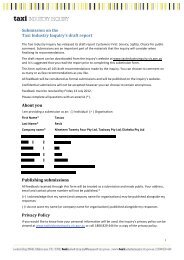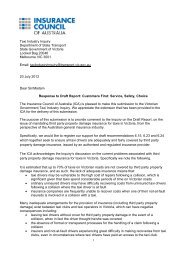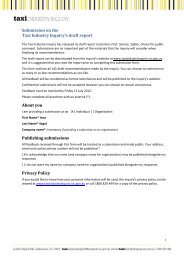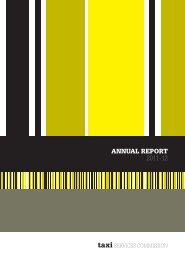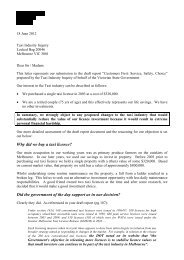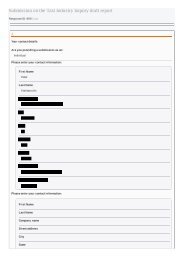Part D â Understanding and improving industry performance (PDF ...
Part D â Understanding and improving industry performance (PDF ...
Part D â Understanding and improving industry performance (PDF ...
You also want an ePaper? Increase the reach of your titles
YUMPU automatically turns print PDFs into web optimized ePapers that Google loves.
Driver obligations to the NSP<br />
NSPs require drivers to sign a network agreement prior<br />
to being able to log into the mobile data terminal <strong>and</strong><br />
to abide by a code of conduct while operating on the<br />
network. In some cases, the drivers must undertake a<br />
training program before being provided access to the<br />
network. The NSP code of conduct or rules for drivers<br />
include obligations for the driver to:<br />
• Wear the uniform of the NSP<br />
• Obey the dispatch rules of the network<br />
• Behave in a courteous way to customers<br />
• Ensure the vehicle is maintained in a clean <strong>and</strong><br />
presentable condition<br />
• Accept all electronic payments forms <strong>and</strong> vouchers<br />
authorised by the NSP<br />
• Attend training as required by the NSP.<br />
NSP rules typically allow for discipline of drivers who are<br />
found in breach of the rules. Sanctions may be applied,<br />
including requiring the driver to undergo re-training or<br />
blocking the driver from the network for a period of time.<br />
Persistent breaches can result in the driver being barred<br />
from the network.<br />
Financial penalties were traditionally used as sanctions<br />
against drivers for breaching depot rules. However, the<br />
accreditation scheme introduced restrictions on their<br />
use that capped fines at $100 <strong>and</strong> required NSPs to<br />
demonstrate that these fines are lawful. 17 In March 2009,<br />
the VTD issued an improvement notice to West Suburban<br />
Taxis requiring removal of all references to financial<br />
penalties from its relevant documents. West Suburban<br />
Taxis applied for the decision to be reviewed by the<br />
Victorian Civil <strong>and</strong> Administrative Tribunal (VCAT) <strong>and</strong> the<br />
decision of the VTD was set aside. 18<br />
Despite the decision, NSPs have claimed that they are<br />
now powerless to sanction drivers <strong>and</strong> are not able to<br />
issue fines to drivers <strong>and</strong> argue that the enforcement of<br />
quality st<strong>and</strong>ards are now the role of the VTD.<br />
In h<strong>and</strong>ing down the VCAT decision in the case above,<br />
the tribunal member noted:<br />
It is clear from the Second Reading Speech that it<br />
was Parliament’s intention that taxi depots (network<br />
service providers) continue to perform the function of<br />
disciplining taxi driver subject to the st<strong>and</strong>ards set by<br />
the Minister. 19<br />
It is clear that is the Minister’s intention that<br />
the disciplinary function performed by network<br />
service providers includes the ability to impose<br />
financial penalties as part of the range of<br />
sanctions available 20<br />
The inquiry underst<strong>and</strong>s that NSPs now seldom use<br />
financial penalties to discipline drivers although many NSP<br />
driver h<strong>and</strong>books continue to refer to these penalties.<br />
Ancillary services<br />
In addition to their role in taking bookings <strong>and</strong> dispatching<br />
them to drivers, primary NSPs offer a range of ancillary<br />
services to taxi operators <strong>and</strong> drivers. The metropolitan<br />
NSPs are known to offer brokerage services for taxi<br />
licences, disburse electronic fare revenue between drivers<br />
<strong>and</strong> operators, run taxi driver training schools <strong>and</strong> own<br />
vehicle fit-out <strong>and</strong> repair shops. Some offer insurance<br />
<strong>and</strong> finance on vehicles, licences <strong>and</strong> assignments. The<br />
primary NSP Black Cabs also provides electronic payment<br />
systems through its parent company, Cabcharge.<br />
Emergency warning <strong>and</strong> GPS tracking<br />
As part of their legislative obligations, NSPs must provide<br />
a system to track taxis within their fleet to provide for the<br />
safety of the driver <strong>and</strong> operator. Currently, this system<br />
works by maintaining a constant GPS link between<br />
the NSP control centre <strong>and</strong> the mobile data terminal<br />
contained in the taxi vehicle. The emergency warning<br />
system activated by the driver through a duress switch<br />
located out of sight of passengers. The system notifies<br />
the call centre <strong>and</strong> provides an open radio channel<br />
allowing audio from the vehicle to be listened to or<br />
recorded. The call centre operator can then assess the<br />
situation <strong>and</strong> notify police or other taxis if required. 21<br />
17 Transport (Compliance <strong>and</strong> Miscellaneous) Act 1983, section 133C,<br />
Business <strong>and</strong> Service St<strong>and</strong>ards, part 3 (21)<br />
18 Gerard Butcher, Victorian Civil <strong>and</strong> Administrative Tribunal, Reference<br />
no. B63/2009, p.11<br />
19 Gerard Butcher, Op. Cit., p.13<br />
20 Ibid., p.14<br />
21 GPS tracking <strong>and</strong> emergency warning systems are requirements<br />
for large networks with 40 plus taxis. Smaller networks may have<br />
alternative arrangements. The operation <strong>and</strong> effectiveness of the<br />
emergency warning system is discussed further in section 17.3.2.<br />
<strong>Underst<strong>and</strong>ing</strong> <strong>industry</strong> <strong>performance</strong> CUSTOMERS FIRST 227



